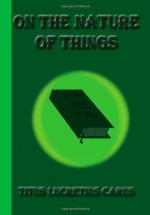|
This section contains 1,402 words (approx. 4 pages at 400 words per page) |

|
The idea that fear is inherent to religion pervades, as we have seen, all Lucretius' poem. Not surprisingly, then, in the programmatic passage of the whole poem, a passage that sets the tone for the rest of the work, Lucretius treats religion as a tyrant to be deposed: "Humana ante oculos foede cum vita iaceret / in terris oppressa gravi sub religione " Fundamental to the understanding of the passage is the exact sense of religio here: it may mean either a feeling of awe or dread, or the established routine of rituals, prayers, and sacrifices. Because Lucretius assails religio so vigorously and crushes it so utterly in this passage, scholars have traditionally preferred the former meaning. They emphasize that here Lucretius disparages the fear of the divine, while remaining consistent with Epicurus' views on piety, that is, the actual worship of the gods. Cyril Bailey, for example, introduces...
|
This section contains 1,402 words (approx. 4 pages at 400 words per page) |

|




